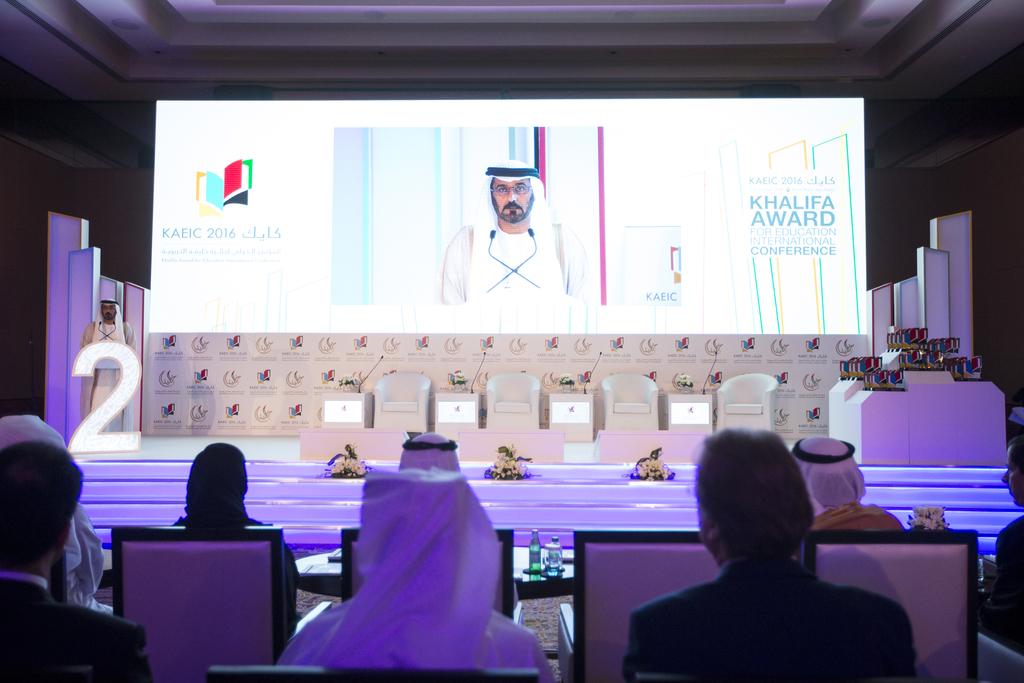ABU DHABI // The merger of three of the emirate’s top higher education institutes will help strengthen the country’s output of quality research and produce higher-calibre graduates, said Minister of Education Hussain Al Hammadi.
The amalgamation of Khalifa University, Masdar Institute and the Petroleum Institute was announced last week by Abu Dhabi Executive Council.
“This triangle will help achieve a strong leap for education and research in the UAE and will be the catalyst for us in our race to propel institutions to achieve highest levels of research because we have a weakness in terms of research,” Mr Al Hammadi told an audience of education leaders at the second annual Khalifa Award for Education International Conference in the capital on Monday.
“We need to provide these institutions with all the support they need so we can achieve a knowledge-based economy, otherwise we will not achieve our goals. This integration will pay off very soon and we expect [it] to result in a pioneering institution that will ultimately build a generation that will be able to achieve the goals of the leadership.”
Dr Ahmad Belhoul, Minister of State for Higher Education, said the merger created a tremendous opportunity to drive research and development. “By bringing together the outstanding research programmes of these academic institutions, we can leverage combined resources and expertise while fostering greater knowledge-sharing.”
The higher-education shake-up was the latest in a number of reforms recently undertaken across all levels of education, changes meant to bring the country closer to meeting the targets set by UAE Vision 2021 National Agenda.
Mr Al Hammadi addressed the restructuring of the UAE’s educational institutions, calling it “a necessity”.
Earlier this year, the Government consolidated the Ministry of Education and the Ministry of Higher Education into one entity responsible for managing all stages of education, from nurseries to universities. The move is to align the “thinking and culture” between the two levels of education and promote greater cooperation, Mr Al Hammadi said.
“We should adopt the same thinking when we have this comprehensive system so that when the student moves from one grade to another, he will be within the same culture, so that the same skills that will be taught at the university will be a continuation of the skills he learnt at school,” Mr Al Hammadi said.
The ministry also announced sweeping changes to the public school curriculum this year. They were aimed primarily at adding more sciences and technology education and preparing pupils to enter college or university without having to go through a foundation year, which will be eliminated in 2018. Universities currently offer a foundation programme to help high school students build the language, science and maths skills they need to enter university.
“There are gaps in mathematics, in Arabic language, but also in English language. We want to bridge this gap and our ambition is to have high school graduates who enter university with certain skills that will help them to raise the standards of the university itself,” Mr Al Hammadi said.
Dr Ali S Alkaabi, deputy vice chancellor for student affairs and enrolment at UAE University, called the merger between the two ministries a “necessity”.
“We had to make this integration to have more of a sense of responsibility and more accountability because, in the end, there was an exchange, a blame game. Now the responsibility and accountability is shared in one unified institution.”
Dr Arif Al Hammadi, director and executive vice president at Khalifa University, said that the year-long foundation programme was often not enough to prepare pupils for postsecondary academic life.
“We have worked on these students the whole year but they still couldn’t earn good grades, which means that the foundations were not good, which means that at school they were not taught the right way,” Dr Al Hammadi said. “Abu Dhabi Education Council and Ministry of Education have conducted reforms in the third cycle to bridge that gap. If the assessment is correct, we will not need a foundation year.”
Dr Karima Al Mazroui, Adec executive director, said summer “bridging courses” would be offered to high school pupils to prepare them for entering university without going through a foundation year.
“We are working really hard to bridge the gap,” she said. “We still have many issues in the system, like attendance and school dropouts. It takes time.”
rpennington@thenational.ae






